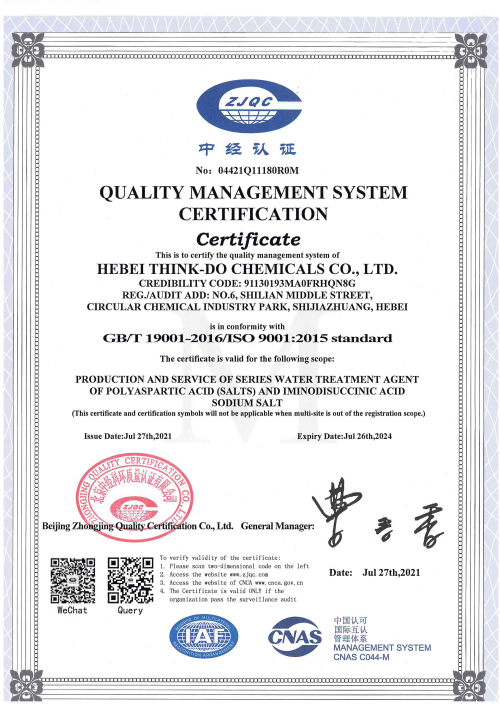
News
Aug . 06, 2024 06:51 Back to list
DMSA as a Powerful Chelating Agent for Heavy Metal Detoxification and Health Improvement Strategies
DMSA, or dimercaptosuccinic acid, is a compound recognized for its ability to function as a chelating agent. It has gained significant attention in both medical applications and environmental science due to its effectiveness in binding heavy metals and facilitating their excretion from the body. The following article explores the role of DMSA as a chelating agent, its applications, and its importance in various fields.
As a chelating agent, DMSA works by forming stable complexes with metal ions, which prevents these metals from engaging in harmful biochemical interactions within the body. Heavy metals such as lead, mercury, and arsenic can accumulate in the human body over time, leading to a plethora of health issues, including neurological impairments, kidney damage, and developmental delays in children. DMSA’s ability to bind these metals is crucial for detoxification processes, making it a viable treatment option for heavy metal poisoning.
.
Beyond its medical usage, DMSA has also found applications in environmental science. The chelating properties of DMSA allow it to bind heavy metals present in contaminated soils and water bodies, enabling remediation efforts. For instance, researchers have investigated the use of DMSA in phytoremediation, a process that employs plants to absorb and concentrate heavy metals from the environment. By enhancing the mobility of these metals, DMSA can facilitate their uptake by plants, leading to a cleaner environment.
dmsa as a chelating agent quotes

Furthermore, DMSA has garnered attention in the field of industrial chemistry. In various manufacturing processes, DMSA serves as an environmentally friendly alternative to traditional, harsher chelating agents. Its biodegradable nature and lower toxicity compared to other chelators make it a preferred choice for industries looking to reduce their environmental footprint.
Despite its advantages, it is essential to approach DMSA with caution. While it is generally safe for use, potential side effects include gastrointestinal disturbances and, less commonly, allergic reactions. Long-term use of DMSA can also lead to the depletion of essential minerals in the body, necessitating careful monitoring by healthcare professionals.
In conclusion, DMSA stands out as a versatile chelating agent with significant applications in medicine, environmental science, and industry. Its effectiveness in binding heavy metals and facilitating their excretion presents a critical tool in managing heavy metal toxicity, particularly in vulnerable populations such as children. As research continues to evolve, the applications of DMSA may expand, paving the way for innovative solutions to tackle heavy metal contamination in both human health and the environment. It is a prime example of how a single compound can have far-reaching implications across various sectors, underscoring the importance of chelation therapy in modern science.
-
Polyaspartic Acid Salts in Agricultural Fertilizers: A Sustainable Solution
NewsJul.21,2025
-
OEM Chelating Agent Preservative Supplier & Manufacturer High-Quality Customized Solutions
NewsJul.08,2025
-
OEM Potassium Chelating Agent Manufacturer - Custom Potassium Oxalate & Citrate Solutions
NewsJul.08,2025
-
OEM Pentasodium DTPA Chelating Agent Supplier & Manufacturer High Purity & Cost-Effective Solutions
NewsJul.08,2025
-
High-Efficiency Chelated Trace Elements Fertilizer Bulk Supplier & Manufacturer Quotes
NewsJul.07,2025
-
High Quality K Formation for a Chelating Agent – Reliable Manufacturer & Supplier
NewsJul.07,2025
